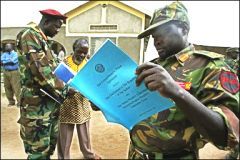Leaders of Sudan’s main southern rebel group debate peace deal
RUMBEK, Sudan, Jan 23, 2005 (AP) — Commanders and leaders of Sudan ‘s main southern rebel group began on Sunday debating a peace deal to end Africa’s longest-running war, its leader said. They will vote Monday on the Jan. 9 comprehensive peace agreement between them and Sudan ‘s government.

|
|
Sudanese People’s Liberation Army (SPLA) soldiers look at a copy of the comprehensive peace agreement, before their meeting in Rumbek, on Sunday, January 23, 2005. (AFP). |
The Sudan People’s Liberation Army’s legislative body is expected to endorse the peace agreement, which its leader John Garang signed with Sudanese Vice President Ali Osman Mohamed Taha.
If the rebel’s National Liberation Council ratifies the deal, it will be legally binding on the entire group.
“They will start discussing this afternoon and by tomorrow, hopefully, they will ratify the agreement,” Garang told journalists.
Both the government and southern rebels set Monday as a deadline for their respective legislatures to approve the deal.
The Arab-Muslim dominated government in the country’s north has yet to debate the deal and it’s not clear when the parliament will debate it because Monday is a Muslim holiday.
For southern Sudan to fully benefit from the peace agreement, the SPLA will help negotiate settlements in the country’s other conflicts, Garang said.
“It is necessary that there be a fair and just political settlement in Darfur and in eastern Sudan so that there is a comprehensive peace agreement all over Sudan ,” Garang said.
The north-south agreement does not cover a 23-month rebellion in Sudan ‘s western region of Darfur or a low-intensity insurgency in the Red Sea Hills area of eastern Sudan .
U.N. and U.S. officials hope that the north-south deal will help end Sudan ‘s other conflicts. The peace agreement provides a formula for southern rebels and the government to share political power and the country’s oil wealth and other natural resources.
Garang said his group has developed relations with government officials during 10 years of on-and-off peace talks. Southern, western and northeastern rebels are also political allies because they are members of the country’s opposition alliance that is based in neighboring Eritrea, said Garang.
Garang also met with the U.N. chief envoy Jan Pronk on Sunday to discuss the mission, size and composition of a U.N. force that would monitor compliance with the cease-fire for southern Sudan .
Two million people died during the war in southern Sudan , mainly from war-induced famine and disease. The rebels have been fighting for greater autonomy and a greater share of the country’s wealth in the mainly African animist and Christian south.
Diplomats and analysts have said that the almost two-year Darfur conflict also endangers the difficult reconciliation process between north and south.
Hardships including disease and malnutrition are believed to have killed more than 70,000 of the displaced within Darfur since March. Thousands more have been killed in fighting since the conflict broke out in February 2003, although no firm estimate of the direct toll of the war exists. About 2 million people have been displaced by the conflict.
